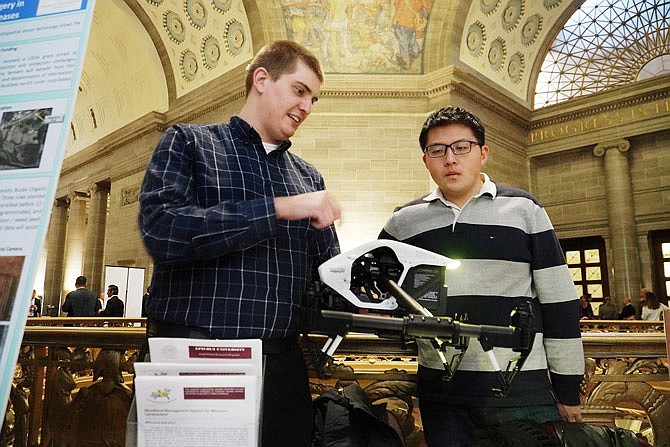Members of Lincoln University's community on Wednesday displayed the university's research and extension work at the Missouri Capitol and met with lawmakers - in a bid to garner support for more funding.
"All of these things require some funding," Clement Akotsen-Mensah said of LU's initiatives as he presented the Lincoln University Cooperative Extension's Integrated Pest Management Program's work to develop economically and environmentally sustainable management techniques for the brown marmorated stink bug, cucumber beetle, Japanese beetle, spotted lanternfly and spotted wing drosophila.
The spotted lanternfly invasive insect is the only bug of the group that's not already in Missouri - and Akotsen-Mensah would like to keep it that way.
Akotsen-Mensah is the LU Cooperative Extension's state extension specialist in integrated pest management.
To address the spread of the also invasive brown marmorated stink bug, he said, the hope is to find a native parasitoid - an insect, such as a certain kind of wasp that has parasitic larvae that live on or in a pest host and kill it.
Akotsen-Mensah said he has been working with LU since September, and he was attracted by the university's small size, diversity and focus on working with small-scale farmers.
Agricultural research and outreach was not the only kind of work on display Wednesday.
Lauren Carter and Brianna Kliethermes showcased the Missouri Small Business Development Center at LU, which has served 184 active clients in Cole, Miller, Moniteau and Osage counties since opening in April 2019.
Client small businesses and entrepreneurs are offered free counseling by the federally funded program in getting a business off the ground.
Carter said it's a huge challenge at the moment for employers to find a skilled workforce, and the center's work aligns with Gov. Mike Parson's workforce development goals.
In addition to showcasing their work, LU staff also met with legislators Wednesday. The schedule included meetings with the speaker of the House, Senate president pro tempore, House and Senate budget and appropriations chairs, and Senate majority leader.
LU seeks a full state match to its 1890 federal land grant funding.
LU President Jerald Woolfolk told the Senate's appropriations committee last month that the university had only a 52 percent match from the state.
When LU does not receive a full state match, money has to be returned to the federal government.
"The university has had to return $17.3 million since 2000, the year match requirements were implemented for 1890 institutions. Returns happened in various years," LU spokeswoman Misty Young said.
LU had been allocated $7.3 million in the federal fiscal year 2020, which is Oct. 1, 2019, through Sept. 30, 2020, Young added. The state had given $3.77 million for the state fiscal year 2020, which is July 1, 2019, through June 30, 2020.

